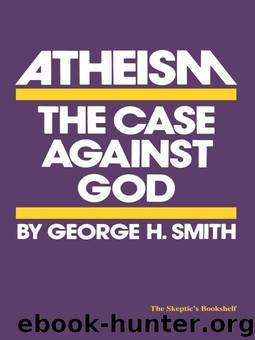Atheism: The Case Against God (Skeptic's Bookshelf) by Smith George H

Author:Smith, George H. [Smith, George H.]
Language: eng
Format: mobi
Publisher: Prometheus Books - A
Published: 2011-01-28T05:00:00+00:00
The appeal to authority is not a special method of acquiring knowledge; it is just one of the many ways which reason employs to gather evidence in the search for truth. We accept the testimony of authorities in some cases, but never uncritically. The appeal to authority is simply an epistemological short cut that must always occur within rational guidelines.
What are these guidelines? First, the authority must be willing to present evidence in support of his beliefs. Second, the proposition of the authority must be verifiable in principle by any person who cares to take the time and effort required. Third, the propositions of the authority can never contradict the laws of logic. A contradiction can never be true, regardless of the academic qualifications of the person advocating it.
Once we see that the appeal to authority, rather than being an alternative to reason, must always be subsumed under the principles of reason, we can readily judge the religious appeal to authority to be an evasion.
Suppose that the theist calls upon his authority to testify for the existence of god. This person claims to be an expert in theological issues, having devoted his entire life to such studies, and he personally assures us of the existence of a god. We then ask this “expert” the same questions that we asked the novice before him–namely, “What do you mean by the term ‛god’?” and, “What evidence do you have for the existence of such a being?” Either this religious authority can answer these questions satisfactorily or he cannot. If he can, the issue is decided in his favor solely within the sphere of rational argumentation, and his alleged expertise is irrelevant to the validity of his arguments. If he cannot, he should not be believed under any circumstances, his alleged expertise notwithstanding. Thus, to argue that we must have faith in a religious authority is to evade the central issue: i.e., Can the theist produce rational grounds in support of his belief? An appeal to authority does not answer this question.
There is a further problem with the notion of a “religious authority.” This designation is ambiguous. As an illustration, consider what it would mean to speak of an astrology expert. To say that Mr. Jones is an authority on astrology would mean that Mr. Jones has a thorough knowledge of the doctrines of astrology, but this does not necessarily imply that Mr. Jones personally believes in the truth of astrology. In fact, we shall assume that Mr. Jones considers astrology to be false.
Now we encounter another astrology expert, Mr. White, who in addition to possessing comprehensive knowledge of astrology, also believes these doctrines to be true. Here we have two legitimate authorities, Mr. Jones and Mr. White, who disagree concerning the truth of astrological doctrines, but both qualify as experts nonetheless. Clearly, therefore, the truth or falsity of astrology cannot be determined by an appeal to either of these authorities (since they contradict each other), so we must listen to the arguments of each authority and then judge on the basis of available evidence.
Download
This site does not store any files on its server. We only index and link to content provided by other sites. Please contact the content providers to delete copyright contents if any and email us, we'll remove relevant links or contents immediately.
From Bacteria to Bach and Back by Daniel C. Dennett(2148)
The God delusion by Richard Dawkins(1848)
Boy Erased by Garrard Conley(1411)
THE SELFISH GENE by Richard Dawkins(1321)
The Falls by Unknown(1141)
the god delusion by richard dawkins(1085)
Christopher Hitchens by The Portable Atheist: Essential Readings for the Nonbeliever(1069)
THE GOD DELUSION by Richard Dawkins(1054)
Drunk with Blood: God's Killings in the Bible by Steve Wells(1044)
Triumvirate of Rationalism: Thomas Paine, Thomas Jefferson, and George Orwell by Christopher Hitchens(1032)
Outgrowing God by Dawkins Richard(1029)
About the Holy Bible by Robert G. Ingersoll(1022)
Atheism: A Very Short Introduction by Julian Baggini(994)
The Rage Against God by Peter Hitchens(988)
The Atheist Muslim by Ali A. Rizvi(984)
Why I Am Not a Christian and Other Essays by Bertrand Russell(937)
Battling the Gods by Tim Whitmarsh(929)
Emancipation of a Black Atheist by D. K. Evans(920)
God Is Not Great by Christopher Hitchens(911)
